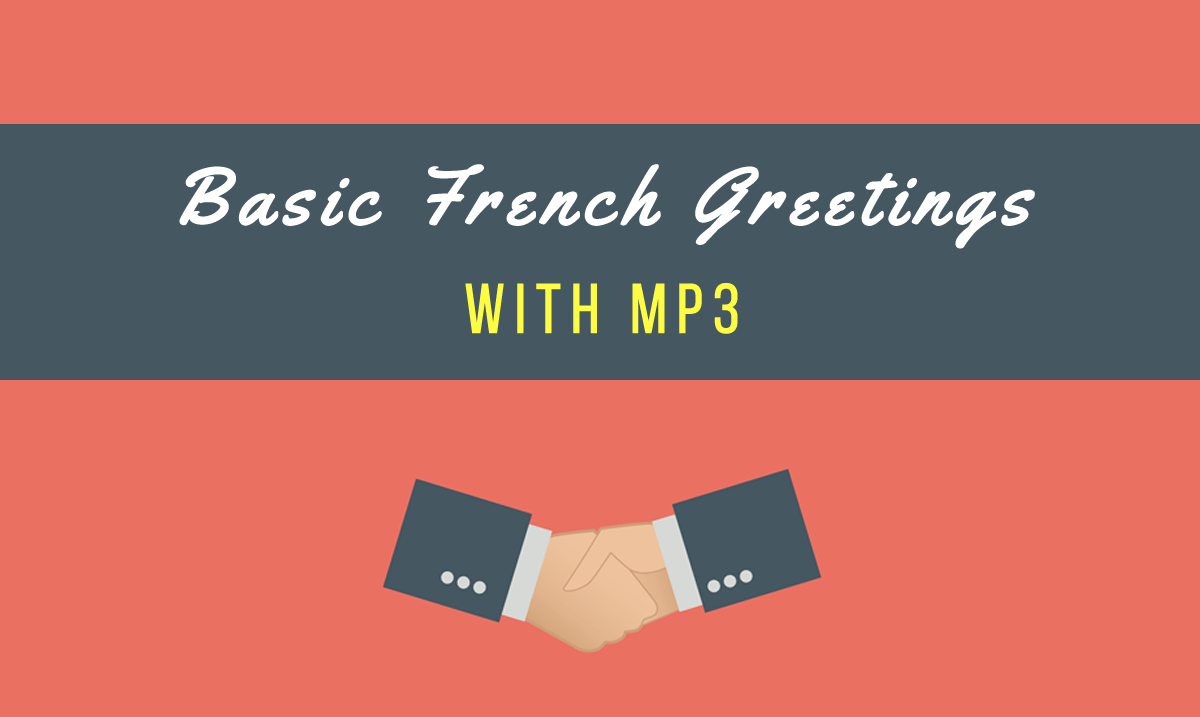One of the very first things you need to know when learning French is the basic French greetings.
How do you say hello and introduce yourself in French?
In this article which originally appeared as the first lesson in the Complete Beginner French course, we will learn all about the basic French greetings.

For the listening exercises, you can download the MP3 files with a requirement to subscribe to the weekly newsletter. If you already signed up before, check your French Learning Package. The MP3 tracks are already there.
Basic French Greetings
Let’s start the lesson with a sample scenario.
Listen to track 1 of the audio files
Man: Bonjour, comment ça va ? (Hello, how are you?)
Child: Bonjour, ça va bien. Comment allez-vous ? (Good, thanks. How are you?)
Man: Je vais bien, merci. (I am good, thank you.)
Child: Comment vous appelez- vous? (What is your name?)
Man: Je m'appelle Monsieur Dupont. Et toi ? (My name is Mister Dupont. And you?)
Child: Je m'appelle Kévin. (My name is Kevin.)
Man: Au revoir, Kévin. (Good bye, Kevin.)
Child: A bientôt, Monsieur Dupont ! (See you soon, Mister Dupont!)
Now, let's continue with some Standard/ Formal Greetings.
Standard/Formal French Greetings
Listen to track 2
When greeting someone during the day, you would usually say "Bonjour," which means "Good day"; if it is evening, you can say "Bonsoir," which means "Good evening."
There are a few ways to say goodbye, the most common being "Au revoir," which means "See you again." You can use this phrase any time of day. You can also use the following phrases at different times of the day:
Informal French Greetings
If that seems a little too complicated, then you could just say "Salut!". This is an informal greeting that means "Hello," but can be used to say "Goodbye" as well, plus you can use it at any time of the day.

Speak, Listen, and Write French like a Native with Talk in French Complete Courses
However, it is a good idea to learn the various greetings and be able to say them accurately in French, especially if you will be conversing with people you do not know very well. It is simply polite to use more formal greetings; "Salut" is really only something you should use with friends or in informal situations -- i.e., not with your boss!
See also: French Slang Greetings
Listening and Practice
Listen to track 3
- Bonjour
- Bonsoir
- Au revoir
- Bonne journée
- Bon après-midi
- Bonne soirée
- Bonne nuit
After greeting someone, you may wish to continue the conversation. There are two questions you will usually ask.
Listen to track 4
"How are you?" in French
There are two ways to ask this question; your choice will depend on whether it is a formal or informal situation.
Formal way:
Question: "Comment allez-vous ? "
Answer: "Je vais bien, merci." (I am good, thank you)
Informal way:
Question: "Comment ça va ?"
Answer: "ça va bien, merci." (Good, thanks)
"What's your name?" in French
Next, you might ask the person’s name, if you do not know him or her.
Question:
"Comment tu t'appelles ?" (informal)
"Comment vous vous appelez ?" (formal)
Answer: "Je m'appelle (your name), et toi ?" ("et toi" means "and you")
Pronunciation
Now, let's practice your pronunciation. Listen to the audio track (transcription below) and try to repeat the word.
Listen to track 5
Bonjour (Good morning)
Bonsoir (Good evening)
Au revoir (Goodbye)
Bonne nuit (Good evening)
Formal situation
Listen to track 6
Comment allez-vous ? (How are you?)
Bien, merci. (Good, thank you.)
Et vous ? (And you?)
Très bien, merci. (Very well, thank you.)
Informal situation (with friends)
Listen to track 7
Salut, Sharon ça va ? (Hi, Sharon, how are you?)
Ça va bien. Et toi ? (I am good, and you?)
Pas mal. (Means, “Not bad,” but in French it has a positive meaning.)
Au revoir ! (See you again!)
A demain ! (See you tomorrow!)
Exercises
Let's begin with a simple exercise to help you memorize what you have just learned.
Exercise 1: Fill in the gap
Sophie (Mrs): Bonjour Monsieur.
Jean Dubois (Mr): ______Madame.
Sophie: Comment allez-vous ?
Jean Dubois: _____, merci, et vous?
Sophie: ______, merci.
Jean Dubois: Comment vous vous appelez ?
Sophie: ______ Sophie. __________?
Jean Dubois: Je m'appelle Jean Dubois.
Answers: Listen to track 8
Sophie (Mrs): Bonjour Monsieur.
Jean Dubois (Mr): Bonjour Madame.
Sophie: Comment allez-vous ?
Jean Dubois: Bien, merci, et vous ?
Sophie: Bien, merci.
Jean Dubois: Comment vous appelez-vous ?
Sophie: Je m’appelle Sophie. Et vous ?
Jean Dubois: Je m'appelle Jean Dubois.
Exercise 2: Translate from English into French
Formal situation:
- Hello, Sir!
- Hello Sharon, how are you today?
- I am fine, and you?
- I am good, too.
Informal situation:
- Hi Claire.
- Hi Lisa.
- How are you?
- Not bad, and you?
- Good.
Additional Exercises
Practice Corner -- Listening Part 1
Listen to track 9 and repeat
- Bonjour (Good morning)
- Bonsoir (Good evening)
- Bonne journée (Good day)
- Bonne soirée (Good evening)
- Bonne nuit (Good night)
- Au revoir (Goodbye)
- Salut (Hi)
- Comment allez-vous ? (How are you?)
- Comment ça va ? (How are you?)
- À demain (See you tomorrow)
- À bientôt (See you soon)
- À tout à l’heure (See you later)
- À ce soir (See you tonight)
- Comment t’appelles-tu? (What is your name?)
- Comment vous appelez-vous ? (What is your name?)
- Je m’appelle … et toi ? (My name is... And you?)
- Quel âge as-tu ? (How old are you?)
- J’ai … ans. (I'm ... years old)
- Où habites-tu ? (Where do you live?)
- J’habite à … (I live in ...)
See also: Useful French Greetings for All Occasions
Practice Corner -- Listening Part 2
Listen to the dialogue (track 10) and answer the questions below. If it is too difficult, read the transcription without the translation and try to answer the questions.
Questions about the dialogue:
Comment s'appelle la femme ? (What's the woman's name?)
1) Sophie 2) Anna 3) Jeanne 4) Manon
Click to reveal the correct answer
Comment s'appelle l'ami de la femme ? (What's the name of the woman's friend?)
1) Jean 2) Gilbert 3) Pierre 4) Eric
Click to reveal the correct answer
Comment va Pierre ? (How is Pierre?)
1) Mal (bad) 2) Bien (fine) 3) Pas très bien (not very good) 4) Super bien (very good)
Click to reveal the correct answer
Transcription: Listen to track 10
Woman: Salut, Martin ! (Hi, Martin!)
Man 1: Salut, Sophie! Ça va ? (Hi, Sophie! How are you?)
Woman: Je vais bien, et toi ? (I'm fine, and you?)
Man 1: Ça va aussi. C'est ton ami ? (I'm fine too. Is he your friend?)
Woman: Oui, c'est mon ami. Il s'appelle Pierre. (Yes, he is my friend. His name is Pierre.)
Man 1: Bonjour, Pierre. Comment vas-tu ? (Hello, Pierre. How are you?)
Man 2: Je vais bien, merci. Bonne journée ! (I'm fine, thank you. Have a good day!)
Man 1: A toute à l'heure ! (See you later !)
---
Do you want more lessons?
Check out our Complete Beginner Course below!

Speak, Listen, and Write French like a Native with Talk in French Complete Courses
SIGN UP BELOW...
AND GET INSTANT ACCESS TO THE FREEBIES
